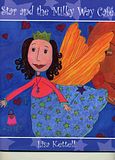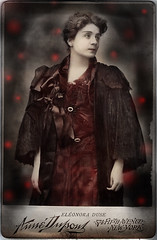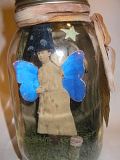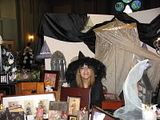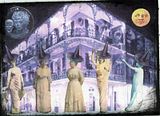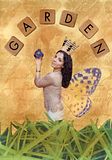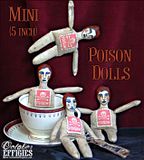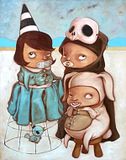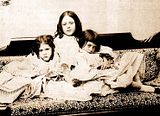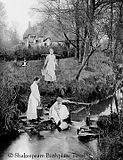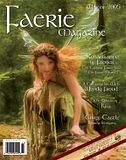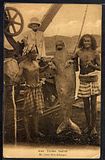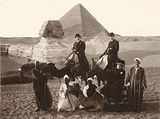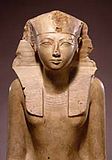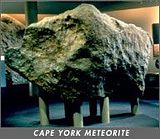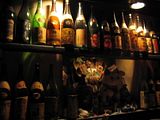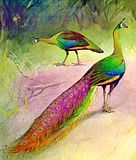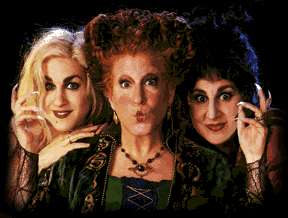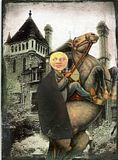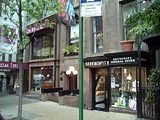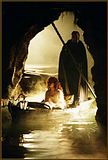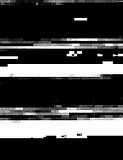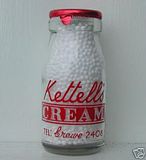Space Butterfly!

Newly fixed Hubble's deep space photos again amaze
By SETH BORENSTEIN - AP Science Writer
By SETH BORENSTEIN - AP Science Writer
WASHINGTON -- A refurbished Hubble Space Telescope is showing Earth the sharpest photos yet of cosmic beauty, complete with heavenly glows. NASA on Wednesday unveiled the first deep space photos taken by Hubble since its billion dollar repair mission last spring. That work included installing two new cameras, other science instruments and replacing broken parts.
"Hubble is back in action. Together, NASA and Hubble are opening new vistas on the universe," astronomer and frequent Hubble user Heidi Hammel said.
The 10 images of galaxies and nebulas - clouds of stellar gas and dust - are sharper than previous photos taken of the same places by Hubble before its fifth and final upgrade. Some have brilliant glows of light that give them halos that to some people can appear heavenly. And one of those resembles an eerie cosmic butterfly, but is really a stellar nursery or nebula not too far awayThe butterfly photo shows details, such as gassy folds in what looks like butterfly wings, that the Hubble previously could not see, said Hubble senior scientist Dave Leckrone.
The glow in that photo and others is hot gas and dust pushed out from the stars, Leckrone said. In a way, it's like a lightbulb, with the star as the filament but the overall glow from the gas, he said.
The images, especially the butterfly, don't just show science, but can evoke a sense of spirituality, Leckrone said.
"What I see is the grandeur of creation, however it got there," Leckrone told The Associated Press.
The most stunning photos involve the cosmos at its most violent: the birth and death of stars.
One shows the stellar nursery Carina Nebula, about 7,500 light years away. A light year is nearly 6 trillion miles. The photo shows an eerie backlit reddish cloud being bombarded by radiation. When Hubble's new camera uses a different light spectrum, the cloud disappears and the infant stars appear. They are only about 100,000 years old with white jets shooting out.
Those jets are cosmic debris "being blasted out at very high velocity at what's going to be a planetary system," said University of Virginia astronomer Bob O'Connell.
Another image shows a compact cluster of thousands of stars - a field of white glimmering with dots of blazing hot blue stars and cooler red ones.
"Hubble is back in action. Together, NASA and Hubble are opening new vistas on the universe," astronomer and frequent Hubble user Heidi Hammel said.
The 10 images of galaxies and nebulas - clouds of stellar gas and dust - are sharper than previous photos taken of the same places by Hubble before its fifth and final upgrade. Some have brilliant glows of light that give them halos that to some people can appear heavenly. And one of those resembles an eerie cosmic butterfly, but is really a stellar nursery or nebula not too far awayThe butterfly photo shows details, such as gassy folds in what looks like butterfly wings, that the Hubble previously could not see, said Hubble senior scientist Dave Leckrone.
The glow in that photo and others is hot gas and dust pushed out from the stars, Leckrone said. In a way, it's like a lightbulb, with the star as the filament but the overall glow from the gas, he said.
The images, especially the butterfly, don't just show science, but can evoke a sense of spirituality, Leckrone said.
"What I see is the grandeur of creation, however it got there," Leckrone told The Associated Press.
The most stunning photos involve the cosmos at its most violent: the birth and death of stars.
One shows the stellar nursery Carina Nebula, about 7,500 light years away. A light year is nearly 6 trillion miles. The photo shows an eerie backlit reddish cloud being bombarded by radiation. When Hubble's new camera uses a different light spectrum, the cloud disappears and the infant stars appear. They are only about 100,000 years old with white jets shooting out.
Those jets are cosmic debris "being blasted out at very high velocity at what's going to be a planetary system," said University of Virginia astronomer Bob O'Connell.
Another image shows a compact cluster of thousands of stars - a field of white glimmering with dots of blazing hot blue stars and cooler red ones.
All but one of the Hubble photos are from inside the Milky Way galaxy. The exception caught five spiral galaxies in a single image.
Soon Hubble will turn its new cameras to the furthest edges of the universe and take photos from soon after the Big Bang.
"Our view of the universe and our place within it will never be the same," NASA Administrator Charles Bolden, who as an astronaut piloted the space shuttle that put Hubble in orbit 19 years ago.
Since the repairs, Leckrone said there has not been a single technical problem with Hubble, which was plagued by blurry images when it was first launched. The first photos from the repaired Hubble came earlier this summer, when the telescope took pictures of Jupiter when an asteroid or comet hit it. They were unscheduled quick black-and-white looks; the photos released Wednesday were planned, longer observations.
The astronauts who helped repair Hubble basked in the celebration of the new photos.
"The hair was standing up on the back of my neck to see the potential of this telescope," said John Grunsfeld.
Mike Massimino said his reaction on seeing the photos was: "Thank God, we didn't break it."
Soon Hubble will turn its new cameras to the furthest edges of the universe and take photos from soon after the Big Bang.
"Our view of the universe and our place within it will never be the same," NASA Administrator Charles Bolden, who as an astronaut piloted the space shuttle that put Hubble in orbit 19 years ago.
Since the repairs, Leckrone said there has not been a single technical problem with Hubble, which was plagued by blurry images when it was first launched. The first photos from the repaired Hubble came earlier this summer, when the telescope took pictures of Jupiter when an asteroid or comet hit it. They were unscheduled quick black-and-white looks; the photos released Wednesday were planned, longer observations.
The astronauts who helped repair Hubble basked in the celebration of the new photos.
"The hair was standing up on the back of my neck to see the potential of this telescope," said John Grunsfeld.
Mike Massimino said his reaction on seeing the photos was: "Thank God, we didn't break it."
This article was in the NJ Star Ledger today, written by:
SETH BORENSTEIN - AP Science Writer
SETH BORENSTEIN - AP Science Writer
Labels: article, hubble, space butterfly

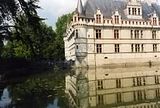
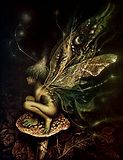
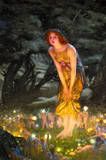
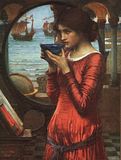
 The Faerie Zine Vol.4 $19.95
The Faerie Zine Vol.4 $19.95